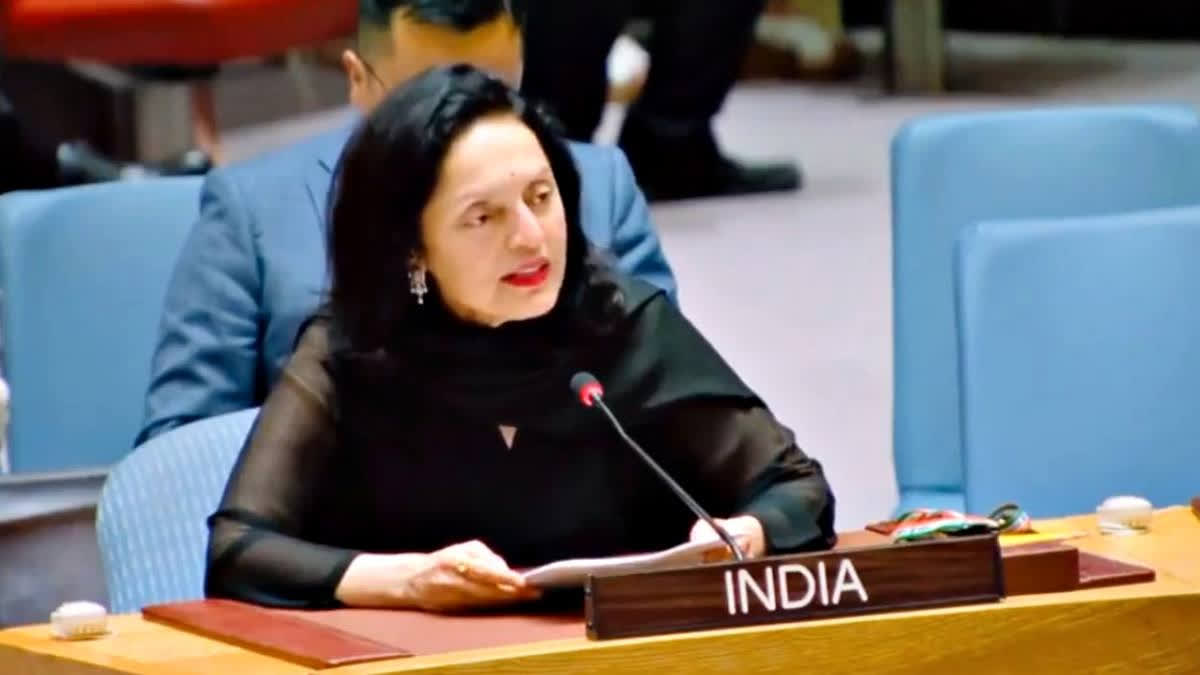United Nations: India has presented a detailed model on behalf of the G4 nations for Security Council reform that includes new permanent members elected democratically by the General Assembly and displays flexibility on the veto issue.
Participating in the Intergovernmental Negotiations on Security Council reform (IGN) on Thursday, India's Permanent Representative to the UN Ambassador Ruchira Kamboj said the UN's 80th anniversary next year serves as a milestone to achieve concrete progress on the long-pending subject.
Kamboj presented the G-4 model' on behalf of Brazil, Germany, Japan and India for debate, dialogue and finally negotiations. The proposals elicited strong support from wider UN members.
The realities of 1945, when the Council was established, have long been superseded by the geo-political realities of the modern era and a new century; with the need for change being felt across the board, Kamboj said as she shared the exhaustive G4 model with UN Member States in the General Assembly.
Catering to these new realities, the G4 model proposes that the Security Council's membership increase from the current 15 to 25-26, by adding six permanent and four or five non-permanent members. Among the six new permanent members, two each are proposed to be from African states and Asia Pacific states, one from Latin American and Caribbean states; and one from Western European and Other states.
The G4 model notes that the current composition of the Security Council, with its glaring under-representation and un-representation of key regions in both categories of membership, is detrimental to its legitimacy and effectiveness. It stressed that the Council's inability to address critical conflicts and maintain international peace and security underscores the urgent need for reform.
Any reform that does not address the lack of representation, particularly in the permanent category, would only exacerbate the current imbalances in the Council's composition and render it ill-equipped to address today's international challenges, she said.
Kamboj highlighted that it is important to note that the G4 model does not specify which member states will occupy the new permanent seats. This decision will be made by the General Assembly in a democratic and inclusive election.
She told the UN membership that the world has undergone a sea change since 1945 and the new realities need to be reflected in the permanent membership. Any proposal that does not address the issue of representation of the Global South, including Africa, Asia and Latin America, in the permanent category does a grave injustice to the aspirations of developing countries for equality.
The G4 model offered flexibility on the veto, an issue that has been a contentious topic among member states as they try to move the needle forward on the reform process that has moved at a snail's pace over the years.
While the new permanent members would, as a principle, have the same responsibilities and obligations as current permanent members, they shall not exercise the veto until a decision on the matter has been taken during a review, Kamboj said. "Nonetheless, we should not allow the veto issue to have a veto over the process of Council reform itself. Our proposal is also a gesture of displaying flexibility on the issue for a constructive negotiation, she said.
Currently, only the five permanent members - China, France, Russia, the UK and the US - hold veto powers and through its use have stalled action in the Council to address global challenges and conflicts such as in Ukraine and Gaza. The remaining 10 nations in the Council are elected to sit as non-permanent members for two-year terms and do not have veto powers.
Highlighting the urgency for reform, Kamboj said the world and the future generations can wait no longer. The ambitious Summit of the Future scheduled to be held at the UN this September and the 80th anniversary of the United Nations next year are important milestones towards which we should aim to make concrete progress.
We must push forward a reform heeding the voice of the young and future generations, including from Africa, where the demand to correct the historical injustices grows ever stronger. Otherwise, we simply risk sending the Council down the path of oblivion and irrelevance.
France's Permanent Representative to the UN Ambassador Nicolas De Riviere said his country has long supported the candidacy of India, Japan, Brazil and Germany for permanent membership. In addition, France fully subscribes to the spirit of the model for comprehensive reform of the Security Council which has just been presented. It is in line with the strong expectations expressed by the vast majority of this Assembly, he said, responding to the G4 model.
The US said it is clear that the strong majority of UN member states, including all 54 African countries, support expanding both permanent and non-permanent seats on the Security Council. For the Security Council to best derive the benefits of both categories, it is important that both the permanent and non-permanent membership be representative of the world as it is today, not the world as it existed in the wake of the Second World War.



